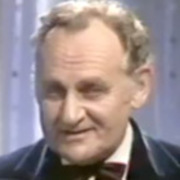
Glyn Tucker
Glyn Tucker was born in post World War I Wellington, to a Welsh miner Dad and English schoolteacher Mum. He learned to sing around the family piano and by 18 was crooning in the capital’s dance halls, where he was billed as “New Zealand’s Bing Crosby”. Tucker also performed during the interval at Wellington’s De Luxe Theatre (now the Embassy), accompanied by a Wurlitzer organ.
As a youth he represented Wellington at soccer and cricket. Later, Tucker’s first gig behind the microphone was reporting on the cricket, and he would go on to commentate international test matches for radio and television. “I would be watching it anyway,” as he told the Auckland Star in 1977.
In the late 30s, just out of college, he replaced a mate on the staff of the New Zealand Racing Conference, the body set up to control the horse-racing industry in NZ. And so Tucker opened the starting gate on a lifelong association with the gee-gees.
Tucker returned to the Conference after war service in Egypt. In 1952 he was appointed Keeper of the New Zealand Stud Book — the register of the births, deaths and marriages in the NZ racing world — a position he led until 1968. In the late 60s he was a recognised authority on thoroughbreds, and became an independent bloodstock consultant under the banner ‘Southern Cross Bloodstock Agency’.
What did he look for in a horse? He told Alex Veysey in a 1977 Sunday Times profile: “They come in all shapes and sizes. They’re like humans. Look at Murray Halberg, When he ran he looked like an accident going to happen. But he won races.”
The same year he told the Auckland Star: “I am one of the lucky people who likes their work. I love horses and I loved the stud side of it. Perhaps more importantly I like the people I meet in horse racing.”
In the early 70s Tucker helped pioneer one of the first live racing telecasts in New Zealand, commenting from a tree platform at Ellerslie. In 1972 Tucker started radio show Straight Talk on Wellington’s 2ZB. It played on Friday nights for three years, and provided the segue into screen work for the man known as New Zealand’s ‘Mr Racing’. “I used to get letters and phone calls from all over the country. Then one day the television people waddled into my office and asked if I would do a programme on racing.”
That programme became Turf Talk. The hour-long show was split into coverage of all things racing related, and a Game of Two Halves-style quiz between sports celebrities of the day. On Turf Talk he worked with a young Phillip Leishman. In a 2012 ScreenTalk interview Leishman described Tucker as “inimitable … an overpowering man, an amazing personality, loved his horses, knew everything about racing.” Leishman described himself as Tucker’s ‘little shadow’, hosting the quiz and tailing Tucker around race courses. “I just loved it.”
Tucker’s genial gift of the gab — “she’ll stay all day like a mother-in-law” — made him telegenic and a sporting identity, and he went on to be punting pundit on Saturday morning TV1 sports preview show Sports Extra.
A singing appearance on Ray Woolf-fronted chat show Two on One in 1977 led to viewer requests for more. Aged 54, Tucker moved from the turf to compering talent — from jugglers, jazz troupes and show girls to Kamahl and Suzanne Prentice — when he fronted TV variety show Everything is Beautiful. He became an idol for older viewers and even cut a record (Step Out and Sing) which went gold. In 1977 Tucker's place in Kiwi culture was indicated by him donning the big red suit in end-of-year show Will the Real Mr Claus Please Stand Up.
Tucker’s next screen excursion into light entertainment was the infamous Club Show (1979), co-hosted with Ernie Leonard. Times and tastes had changed; the live light entertainment spectacular found little love from the public or critics.
But Tucker treated his screen work as a ‘hobby’ and never took himself or his celebrity too seriously, “I’m a hard man to get annoyed. Other people get sad and sour, but life’s too short.” The toilets in his office were labelled ‘colts’ and ‘fillies’.
By the early 80s racing’s TV form was waning and Tucker’s trackside shows had been scratched, but he continued to feature as a commentator on cricket and live racing telecasts for Sport on One. “G’day Glyn, how's it going?” chants from young sports fans followed him down the street and from the stands.
In 1978 he published autobiography Thoroughbreds are My Life. Tucker made his final screen appearance on Auckland Cup Day 1984, when he left his sickbed to describe the big race.
Tucker died in May that year from a heart ailment, aged 62. He requested to be buried on a Thursday. “That’s a day my racing mates won’t have any excuse for not attending [my funeral].” He was made an MBE for services to the racing industry.
TV critic Barry Shaw eulogised in the NZ Herald: “the viewers of New Zealand do not really know how good Glyn Tucker was for New Zealand television … just as a lot of racegoers never wake up to how good a performer a horse is until it is spent — and is gone.”
Sources include
Infofind - Radio New Zealand Library
Helen Paske, ‘A Horse For All Courses’ - NZ Listener, 4 March 1978, Page 12
Barry Shaw, ‘Glyn Tucker — Always Ready to Give it a Go’ - The New Zealand Herald, 30 May 1984
Alex Veysey, ‘Sunday Profile’(Interview) - The Sunday Times, 17 April 1977, Page 6
‘Enter the Oldest Pop Singer in the World’(Interview) - The Auckland Star, 24 September 1977
‘Glyn Tucker to Host Sunday Show’- The Evening Post, 1 July 1977